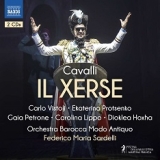Francesco Cavallis Il Xerxe ähnelt Händels Serse von 1738 und wurde 1655 in Venedig uraufgeführt. Die Oper war so beliebt, dass der Komponist fünf Jahre später gebeten wurde, sie in Paris anlässlich der Hochzeit von Ludwig XIV. aufzuführen.
Die Handlung besteht im Wesentlichen aus den Bemühungen des persischen Xerxes, die schöne Vasallin Romilda für sich zu gewinnen, die allerdings in den Bruder des Königs, Arsamene, verliebt ist. In die Intrigen verwickelt sind auch die anderen Hauptfiguren: Amastre, die dem persischen König bereits versprochene Frau, und Adelanta, die Schwester von Romilda, die sich allzu gerne auf dem Thorn sehen würde.
Countertenor Carlo Vistoli singt die Titelrolle mit einer warmen und runden, gut geführten Stimme, die auch den Charakter der wankelmütigen Figur glaubhaft herüberbringt.
Mit ihrer kräftigen Stimme gelingt es Gaia Petrone die Arsamene stimmlich gut und darstellerisch glaubwürdig zu interpretieren.
Ekaterina Protsenko singt eine sehr attraktive Amastre, und auch Caterina Lippo kann als Romilda überzeugen. Die übrigen Rollen sind zufriedenstellend besetzt.
Frederico Maria Sardelli sorgt an der Spitze des exzellenten Orchestra Barocca Modo Antiquo für eine temperamentvoll fließende und energiegeladene Aufführung.
Francesco Cavalli’s Il Xerxe is similar to Handel’s Serse from 1738 and was first performed in Venice in 1655. The opera was so popular that five years later the composer was asked to perform it in Paris for the wedding of Louis XIV.
The plot essentially consists of the efforts of the Persian Xerxes to win over the beautiful vassal Romilda, who is, however, in love with the king’s brother, Arsamene. The other main characters are also involved in the intrigues: Amastre, the woman already promised to the Persian king, and Adelanta, Romilda’s sister, who would love to see herself on the Thorn.
Countertenor Carlo Vistoli sings the title role with a warm and round, well-managed voice, which also convincingly conveys the character of the fickle figure.
With her powerful voice, Gaia Petrone succeeds in interpreting Arsamene in a vocally good and credible manner.
Ekaterina Protsenko sings a very attractive Amastre, and Caterina Lippo is also convincing as Romilda. The other roles are satisfactorily cast.
Frederico Maria Sardelli leads the excellent Orchestra Barocca Modo Antiquo in a spirited, flowing and energetic performance.
























